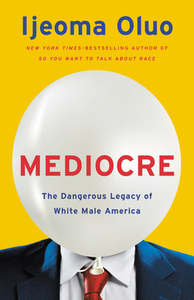Take a photo of a barcode or cover
One of the better essay books that I have read. I loved the conclusion. Very good conversation happening with the topics discussed. I am definitely reading her other work because of how good this one was. Football essay was fabulous.
Fantastic thesis and much needed in our conversation today - but she sometimes loses sight of the thesis. Still, very worthwhile, a great starting place for conversation, and the conclusion chapter is masterful.
Yes, this one is pretty good. If you are going to read an Oluo book, make sure to start with this one.
There are three essays that are must-read in this work.
1. The one about Bernie, his campaign, and his (white male) supporters ("For Your Benefit, in Our Image: The Centering of White Men in Social Justice Movement"). [In this essay, Oluo also writes about Biden, who is both for and against busing.]
"If you are a black person who agrees with Sanders that economic inequality is a major issue in this country (as I am) but also feels that we must address issues of race if we are going to bring economic equality to everyone (as I do), Sanders can be very frustrating (and he is). He seems to fail to understand that the system of race has been built to ensure that Black and brown people will remain at the bottom of the economic ladder."
2. The one about American football, its legacy, and what the sport represents ("Go Fucking Play: Football and the Fear of Black Men").
And most importantly,
3. "Socialists and Quota Queens: When Women of Color Challenge the Political Status Quo."
In this essay, Oluo writes about Shirley Chisholm, who ran for president in 1972. If you haven't heard about Shirley Chisholm, that is not surprising. Black women who make history are often written out of it. In this essay, Oluo also writes about how many white men see a political landscape dominated by white men and think it is that way because white men are just more politically minded. They think that the absence of women and people of color from powerful rooms is due to self-selection. They do not question how unwelcoming the room they have built might be. They do not question whether or not the discussions they are having in that room are inclusive and generate productive discussions for women and people of color.
There are three essays that are must-read in this work.
1. The one about Bernie, his campaign, and his (white male) supporters ("For Your Benefit, in Our Image: The Centering of White Men in Social Justice Movement"). [In this essay, Oluo also writes about Biden, who is both for and against busing.]
"If you are a black person who agrees with Sanders that economic inequality is a major issue in this country (as I am) but also feels that we must address issues of race if we are going to bring economic equality to everyone (as I do), Sanders can be very frustrating (and he is). He seems to fail to understand that the system of race has been built to ensure that Black and brown people will remain at the bottom of the economic ladder."
2. The one about American football, its legacy, and what the sport represents ("Go Fucking Play: Football and the Fear of Black Men").
And most importantly,
3. "Socialists and Quota Queens: When Women of Color Challenge the Political Status Quo."
In this essay, Oluo writes about Shirley Chisholm, who ran for president in 1972. If you haven't heard about Shirley Chisholm, that is not surprising. Black women who make history are often written out of it. In this essay, Oluo also writes about how many white men see a political landscape dominated by white men and think it is that way because white men are just more politically minded. They think that the absence of women and people of color from powerful rooms is due to self-selection. They do not question how unwelcoming the room they have built might be. They do not question whether or not the discussions they are having in that room are inclusive and generate productive discussions for women and people of color.
I'd like to thank Netgalley and the publisher for an ARC of this book. This review is written with complete honesty.
This book is hard to read. It made me angry at how unfairly our society has been built, and it made me feel frustrated with how little progress we have made. That's not the book's fault though. It's society's.
This book was incredibly interesting. I appreciated how the sections were organized, logically building a case that was well researched (The number of sources she cited was staggering) and which was told with moments where the author's voice clearly mirrored my own thoughts.
I found myself frequently taking time to ponder what it was she had said, letting the major points of the argument turn over in my head so I could hoard them for later when I would need that ammo.
This book is highly discussable, and I would imagine that it would be good for a book club to read so that you would have others to talk with.
This book is hard to read. It made me angry at how unfairly our society has been built, and it made me feel frustrated with how little progress we have made. That's not the book's fault though. It's society's.
This book was incredibly interesting. I appreciated how the sections were organized, logically building a case that was well researched (The number of sources she cited was staggering) and which was told with moments where the author's voice clearly mirrored my own thoughts.
I found myself frequently taking time to ponder what it was she had said, letting the major points of the argument turn over in my head so I could hoard them for later when I would need that ammo.
This book is highly discussable, and I would imagine that it would be good for a book club to read so that you would have others to talk with.
I really liked this book because it talked about the issues that impact Black communities in the US specifically because of a system designed to uphold white supremacy. She shares examples and data on what is happening and the impacts of white supremacy, but leaves us with a sense of hope. That divesting from this narrative will only benefit all of us, rather than just cis-het white men.
4.5 stars. Was expecting this to be a bit different from what it ended up being. Really more focused on systems of white supremacy being present in all aspects of life than about white males as a group. I learned a lot of historical info that I didn’t already know.
Mediocre is anything but mediocre. Oluo lays out how we have perpetuated white supremacy and racism by celebrating the simple mediocrity of white maleness. With a seat at the table, she elbows room for other women and people of color, the biggest victims of this mediocrity, and unpacks the dangers of societal expectations. Well-researched and still accessible, this book will make you really angry but in a good way.
I devoured this book. I got it initially from the library and started reading it on the last couple of days figuring I'd put another hold to finish it. I got so engrossed in it - I went and bought a copy so I could finish it.
This book is incredibly complex but if I had to describe it in one sentence - I'd say it is a takedown of the patriarchy. It does a deep dive into several prominent successful men and how they got their power (even those on the left) and how it relates to white male supremacy. It also explores topics like police brutality, women in leadership positions, and the NFL.
Have you heard of the glass cliff? Me neither. Basically, it is a sociological concept that companies are more likely to hire women into leadership positions when the company is struggling. This increases the chance of failure and gives them a great scapegoat - Ellen Pao & Marissa Mayer are two examples. This book looks at topics that aren't new to most but what is new to me was her perspective on them.
A lot of these topics don't feel directly related but I was impressed with how Oluo tied them all together at the end. I'm still thinking about her concluding argument. My only critique is that I wish she had spent more time developing several of the concepts that she uses to tie her argument together - suicides, white male terrorism, and school shootings.
The audiobook is narrated by the author. As she shares some personal parts of herself throughout the book, it makes them so much more powerful.
I cannot recommend this book enough.
This book is incredibly complex but if I had to describe it in one sentence - I'd say it is a takedown of the patriarchy. It does a deep dive into several prominent successful men and how they got their power (even those on the left) and how it relates to white male supremacy. It also explores topics like police brutality, women in leadership positions, and the NFL.
Have you heard of the glass cliff? Me neither. Basically, it is a sociological concept that companies are more likely to hire women into leadership positions when the company is struggling. This increases the chance of failure and gives them a great scapegoat - Ellen Pao & Marissa Mayer are two examples. This book looks at topics that aren't new to most but what is new to me was her perspective on them.
A lot of these topics don't feel directly related but I was impressed with how Oluo tied them all together at the end. I'm still thinking about her concluding argument. My only critique is that I wish she had spent more time developing several of the concepts that she uses to tie her argument together - suicides, white male terrorism, and school shootings.
The audiobook is narrated by the author. As she shares some personal parts of herself throughout the book, it makes them so much more powerful.
I cannot recommend this book enough.
When she began this book with the quote, "With the Confidence of a Mediocre white man," I knew I was in for a good time. This book did an amazing job of reaffirming my existence and power as a Black Woman while also systemically addressing the components of white male mediocrity.





